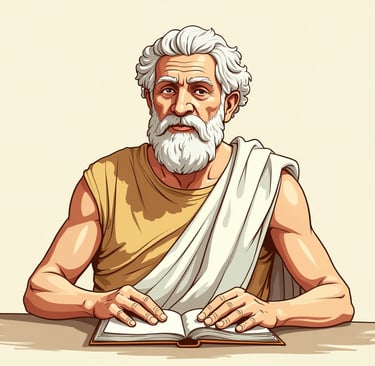Discourses and Selected Writings: Epictetus' Guide to Stoic Philosophy
"Discourses and Selected Writings" by Epictetus is a cornerstone text of Stoic philosophy, offering timeless wisdom on living a virtuous and fulfilling life. This collection of teachings, compiled by Epictetus' student Arrian, provides practical guidance on applying Stoic principles to everyday challenges and ethical dilemmas.
STOICISM
8/13/20242 min read
Who Was Epictetus?
Epictetus was a Greek Stoic philosopher who lived from 55 to 135 CE. Born into slavery, he later gained his freedom and became one of the most influential Stoic teachers of his time. His philosophy emphasizes personal ethics, the power of reason, and the importance of living in harmony with nature.
Key Themes in Discourses and Selected Writings
1. The Dichotomy of Control
One of Epictetus' central teachings is the importance of distinguishing between what is within our control and what is not. He argues that true freedom and happiness come from focusing our energy on our own thoughts and actions, rather than external events.
2. Virtue as the Highest Good
Epictetus emphasizes that virtue is the only true good and that external circumstances, wealth, and social status are ultimately indifferent to one's happiness and moral worth.
3. The Role of Reason
The philosopher stresses the importance of using reason to understand the world and make ethical decisions. He teaches that by cultivating our rational faculties, we can overcome destructive emotions and live more harmoniously.
4. Acceptance and Resilience
Epictetus advocates for accepting life's challenges with equanimity and viewing obstacles as opportunities for growth and the exercise of virtue.
Practical Wisdom for Modern Readers
Despite being written nearly two millennia ago, "Discourses and Selected Writings" offers valuable insights for contemporary readers:
Develop mental resilience in the face of adversity
Practice mindfulness and self-reflection
Cultivate healthy relationships and social responsibility
Embrace a life of continuous learning and self-improvement
Find contentment through aligning actions with personal values
The Structure of the Book
The work is divided into four books of "Discourses," which are essentially lecture notes taken by Arrian. These are complemented by the "Enchiridion" (or "Handbook"), a concise summary of Epictetus' teachings, and various fragments of his philosophy.
Influence and Legacy
Epictetus' teachings have had a profound impact on philosophy, psychology, and self-help literature. His ideas have influenced figures ranging from Roman emperor Marcus Aurelius to modern cognitive behavioral therapy pioneers.
Conclusion
"Discourses and Selected Writings" remains a vital resource for those seeking practical wisdom and ethical guidance. Epictetus' straightforward style and focus on applicable philosophy make this work accessible and relevant to readers from all walks of life.
Whether you're a student of philosophy, a seeker of personal growth, or simply curious about Stoic thought, this collection offers invaluable insights into living a life of virtue, resilience, and inner peace. In our fast-paced, often chaotic world, the timeless wisdom of Epictetus continues to provide a beacon of clarity and purpose.


Waste no more time arguing about what a good man should be. Be one - Marcus Aurelius
We suffer more often in imagination than in reality - Seneca
Wealth consists not in having great possessions, but in having few wants - Epictetus
